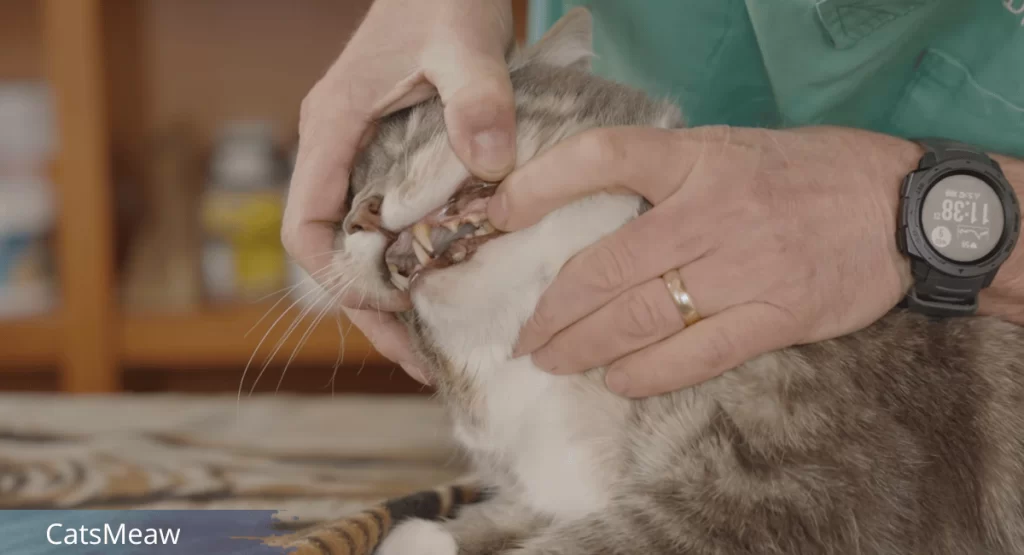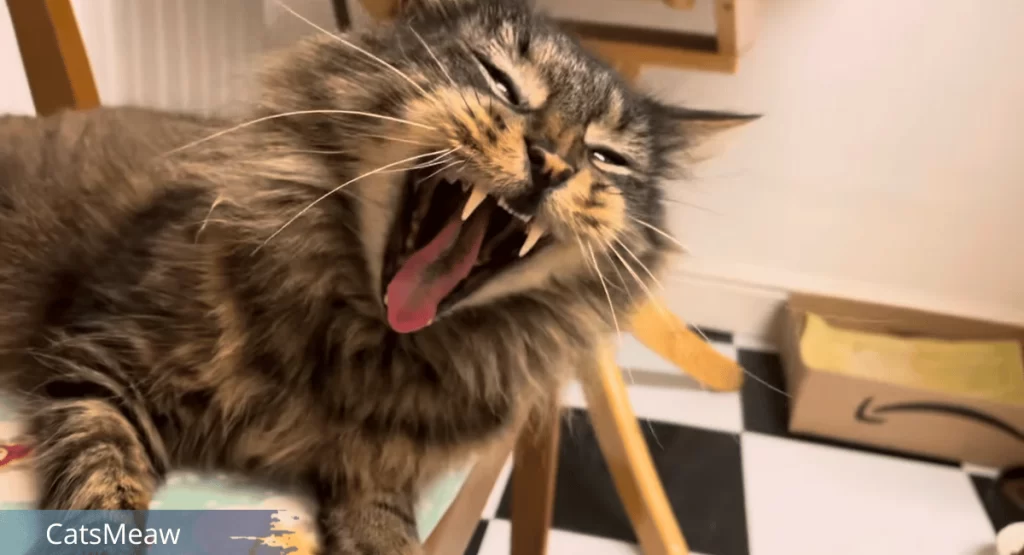Cats, with their mystique and grace, often communicate in subtle ways. However, when you hear your cat grinding their teeth, it’s a signal you cannot and should not ignore. It’s more than just an odd noise; it could be an indicator of underlying health issues that need your attention. In this comprehensive guide, we delve into the reasons behind cat teeth grinding, how to address it, and when it’s time to seek professional help.

Table of Contents
Why do cats grind their teeth?
Cat teeth grinding, a condition known as bruxism, can be a perplexing phenomenon for any pet owner. This behavior could be a reaction to pain, a sign of discomfort, or an attempt to deal with an irritation in the mouth. Understanding the root cause is crucial as it helps in addressing the issue effectively.
One of the primary reasons a cat may grind its teeth is due to dental problems. Just like in humans, cats can suffer from a variety of dental issues, such as tooth decay, gum disease, or even a misalignment of the teeth and jaw. These dental concerns can cause significant discomfort, leading your furry friend to grind its teeth in an attempt to alleviate the pain.
Another factor to consider is stress or anxiety. Cats are sensitive creatures, which means that small changes in their environment or routine may lead to stress. This emotional turmoil can manifest physically, with teeth grinding being one of the outlets for their anxiety. Identifying and reducing stress triggers can significantly help in mitigating this behavior.
Common reasons for cat teeth grinding
Diving deeper into the reasons behind cat teeth grinding, it’s important to explore the common triggers. Besides dental issues and stress, medical conditions can also lead to bruxism in cats. For instance, gastrointestinal problems, such as acid reflux or inflammatory bowel disease, can cause discomfort that a cat may try to soothe by grinding its teeth.
Another health concern to be aware of is nutritional deficiencies. Cats require a balanced diet to maintain optimal health, and a lack of certain nutrients can lead to various health issues, including problems with their teeth and gums. Ensuring your cat has a nutritious and well-balanced diet is a key step in preventing teeth grinding caused by dietary deficiencies.
Lastly, oral tumors or growths can also be a culprit. While less common, these serious conditions can cause significant pain and discomfort, leading a cat to grind its teeth. Regular veterinary check-ups are essential in detecting such issues early and addressing them promptly.
Dental issues that may cause teeth grinding in cats
Focusing on dental health, it’s clear that this aspect is crucial in understanding cat grinding teeth. Periodontal disease, characterized by inflammation and infection of the gums, is a widespread issue in cats. If left untreated, it can lead to severe pain, tooth loss, and may even contribute to more significant health problems.
Tooth resorption is another dental condition that affects cats. This painful process involves the gradual destruction of a tooth or teeth, leading to significant discomfort. Cats suffering from tooth resorption may grind their teeth in an attempt to relieve the pain.
Related: Best Tips For Brushing Your Cat’s Teeth
Furthermore, dental abscesses, which are pockets of pus caused by bacterial infection, can also lead to cat teeth grinding. These abscesses can cause excruciating pain, making immediate veterinary care imperative to alleviate your cat’s suffering and prevent further complications.
When should you be concerned about your cat grinding their teeth?
While occasional teeth grinding may not always signify a serious problem, consistent or frequent episodes should raise a red flag. If you notice your cat grinding its teeth along with other symptoms, such as drooling, difficulty eating, bad breath, or a visible decrease in grooming habits, it’s time to take action.

Another indicator of concern is a change in behavior. Cats in pain may become more withdrawn, less active, or show aggression when touched around the mouth or face. These behavioral changes, coupled with teeth grinding, warrant a closer examination by a professional.
Moreover, if your cat’s teeth grinding is accompanied by weight loss, vomiting, or diarrhea, it could be indicative of broader health issues that require immediate attention. These signs suggest that the teeth grinding is more than just a quirk, but rather a symptom of a potentially serious condition.
How to prevent teeth grinding in cats
Prevention is always better than cure, especially when it comes to your cat’s health. Ensuring your cat maintains good dental hygiene is paramount. Regular brushing of your cat’s teeth with a veterinarian-approved toothpaste can help prevent dental issues that lead to teeth grinding.
Providing your cat with dental-friendly toys and treats can also play a significant role in maintaining oral health. These products are designed to reduce plaque and tartar buildup, promoting healthier teeth and gums.
Additionally, a balanced diet is crucial in preventing nutritional deficiencies that could lead to cat teeth grinding. Consult with your veterinarian to choose the best diet plan for your cat, ensuring it receives all the necessary nutrients for optimal health.
Tips for managing cat teeth grinding
If your cat has already started grinding its teeth, there are several strategies you can employ to manage and potentially reduce this behavior. First, create a calm and stress-free environment for your cat. This may involve establishing a consistent routine, providing plenty of hideaways and resting areas, and minimizing loud noises or sudden changes in the household.
Next, schedule regular veterinary check-ups to monitor your cat’s dental and overall health. Early detection of dental issues or other health problems can significantly improve the outcome and reduce the likelihood of teeth grinding.
Lastly, consider behavioral therapy or medication for cats with anxiety-related teeth grinding. Your veterinarian can recommend appropriate treatments or refer you to an animal behaviorist to address the underlying causes of stress and anxiety in your cat.
Dental care for cats – importance and tips
Investing in your cat’s dental care is an investment in its overall well-being. Start by familiarizing your cat with teeth brushing at an early age, if possible. Use a soft-bristled brush and cat toothpaste, introducing this routine gradually and with plenty of positive reinforcement.
Regular veterinary dental check-ups are crucial. These check-ups allow for professional cleaning, removal of plaque and tartar, and early detection of potential issues. Your veterinarian can also provide you with specific advice tailored to your cat’s individual needs.
Additionally, be mindful of the signs of dental distress in your cat, including pawing at the mouth, drooling, and reluctance to eat. Recognizing these signs early can lead to prompt treatment and a quicker recovery.
When to visit a veterinarian for cat teeth grinding
If you observe your cat grinding its teeth, especially if other concerning symptoms accompany this behavior, it’s time to visit a veterinarian. A comprehensive examination can help identify the underlying cause, whether it’s dental issues, gastrointestinal problems, or stress.
Be prepared to provide your veterinarian with a detailed history of your cat’s health, diet, and behavior. This information can be invaluable in diagnosing the cause of teeth grinding and developing an effective treatment plan.
Remember, the sooner you seek professional advice, the better the chances of alleviating your cat’s discomfort and preventing further health complications.
Treatment options for cat teeth grinding
Treatment for cat grinding teeth varies widely, depending on the underlying cause. For dental-related issues, professional cleaning, tooth extraction, or other dental procedures may be necessary. If a medical condition is to blame, addressing that specific issue can alleviate the teeth grinding.
Related: Best Bath & Grooming Tips For Your Cat
In cases where stress or anxiety is the culprit, environmental modifications, pheromone diffusers, or even medication may be recommended to help your cat feel more at ease. It’s essential to work closely with your veterinarian to determine the most appropriate treatment plan for your cat’s unique situation.
Conclusion
Cat teeth grinding can be a perplexing and concerning behavior for any pet owner. Understanding the potential causes and knowing when to seek professional help are crucial steps in ensuring your feline friend’s health and well-being. Through preventative measures, regular veterinary care, and appropriate treatment, you can help alleviate your cat’s discomfort and prevent further health issues. Remember, your cat relies on you to be its advocate and protector, so stay attentive to its needs and proactive in its care.
